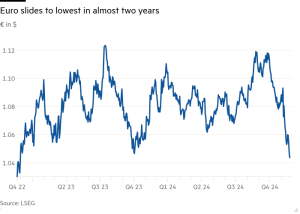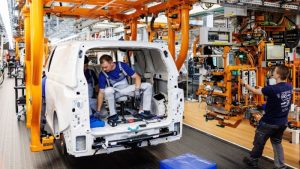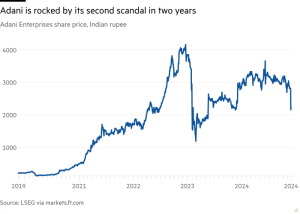China arrests South Korean chip engineer on espionage charges
Unlock the Editor’s Digest for free
Roula Khalaf, Editor of the FT, selects her favourite stories in this weekly newsletter.
China has detained a South Korean chip engineer on espionage charges, Beijing confirmed on Tuesday, escalating a brewing tech war between the east Asian neighbours over the critical semiconductor industry.
The engineer, who is in his 50s and lives in Hefei in China’s Anhui province, was arrested in December, according to diplomats cited by South Korea’s state-owned news agency Yonhap.
China’s foreign ministry confirmed the detention of a South Korean citizen on espionage charges and said it had notified Korean officials. China “investigates illegal activities in accordance with the law and has also ensured that the individual’s lawful rights are fully protected”, said foreign ministry spokesperson Lin Jian.
The South Korean foreign ministry said it was providing the engineer and his family with consular services. The Financial Times has confirmed that the individual remains in detention in China.
The arrest was the first of a South Korean national under China’s revised anti-espionage laws that have rattled foreign business in the country. It also comes as South Korea, home to the world’s leading two memory chip companies, battles to maintain its technological edge in the $158bn sector.
“Competition between China and South Korea is intensifying in the chip sector,” said Jaemin Lee, a trade expert at Seoul National University. “Although Korean companies like Samsung and SK Hynix still maintain their technological edge over China in advanced memory chips, the gap is narrowing.
“We’re likely to see more of this kind of industrial espionage cases involving the two countries, especially in high-tech areas, as they see semiconductors as a key industry for their national security.”
Beijing has detained a number of foreign business figures, including British consultant Ian Stones and a Japanese executive at Astellas Pharma, amid a growing focus on national security under President Xi Jinping.
Authorities have also cracked down on foreign consultancies, raiding the Shanghai office of US consultancy Bain last year in a probe tied to its work on a semiconductor-related project for a South Korean company.
According to South Korea’s Chosun Ilbo newspaper, Chinese investigators “isolated and interrogated” the South Korean engineer, identified as “Mr A”, at a hotel for more than five months.
According to Yonhap, authorities suspected him of leaking semiconductor-related information to South Korea. He had previously worked at Samsung Electronics and CXMT, China’s leading memory chip producer.
Analysts noted that case mirrored South Korean prosecutors’ indictment in January of a Korean engineer, known as “Mr Kim”, on suspicion of leaking Samsung’s memory technologies to CXMT.
In another case Choi Jin-seok, a former senior executive at Samsung and SK Hynix, was arrested by South Korean authorities on suspicion of attempting to build a “copycat” memory plant in Xi’an using stolen Samsung blueprints.
Ben Forney, a researcher at Seoul National University, said that “it seems improbable that Mr A would benefit from passing trade secrets to South Korean competitors, given that CXMT’s memory technology lags behind South Korea’s”.
Forney noted that Seoul was engaged in a campaign to clamp down on Chinese efforts to acquire Korean technology. Earlier this month, South Korea introduced its latest package of measures to detect and punish technology “leakage” to China, which was the destination in 10 of the 12 such cases registered this year by South Korea’s National Police Agency.
Beijing has also become more aggressive in an attempt to counter US efforts to curtail its access to cutting-edge chipmaking technology and equipment.
Korean companies in sectors such as electric vehicle batteries, steel and petrochemicals have mounted their own legal fightback against perceived Chinese intellectual property theft, stepping up anti-dumping and patent infringement complaints against Chinese rivals.
Last week LG Chem, the parent company of South Korea’s leading battery producer LG Energy Solution, filed a patent infringement lawsuit in Seoul against the Korean unit of Chinese battery materials company Ronbay.
Additional reporting by Nian Liu in Beijing
#China #arrests #South #Korean #chip #engineer #espionage #charges





